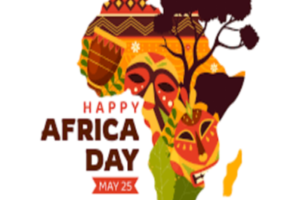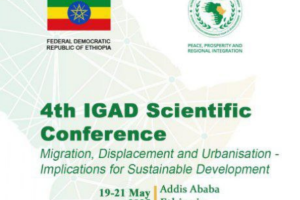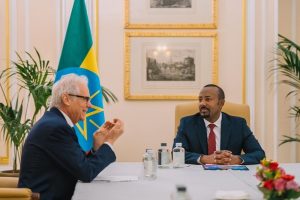
IGAD, the Intergovernmental Authority on Development can lead efforts to address the refugee crisis in the Horn of Africa. It is essential for IGAD to receive worldwide support to cope up with the staggering refugee crisis in the region. International support is necessary to ensure the well-being and protection of individuals who have been forced to leave their homes owing to manmade and natural conflict.
In fact the region is home to a large number of refugees who have fled their homes due to conflict, violence, persecution and other related aspects. These refugees face numerous challenges, including limited access to basic services such as food, water, and shelter. And, countries are trying toohard to meet the growing financial and material supports refugees do demand.
Finding durable solutions for refugees is a key step in addressing the crisis. This entails not only providing immediate humanitarian assistance but also addressing the underlying causes of displacement. The bloc will have the necessary tools to provide vital services like healthcare, education, and shelter to vulnerable individuals with the help of the international community.
Supporting IGAD in tackling the refugee crisis also contributes to regional stability and security. When refugees are provided with the necessary assistance and opportunities, it reduces the risk of tensions and conflicts within and between nations. By addressing the root causes of displacement, the regional bloc can lead collective efforts to create conducive to peace and stability in the Horn of Africa.
Refugees have the potential to be active contributors to the societies that host them. Many possess valuable skills, experiences, and knowledge that can benefit both the refugees and the host communities.
When refugees are given the necessary assistance and opportunities, they can contribute to society. Refugees are often forced to flee their homes due to conflict, persecution, or other forms of violence. This displacement not only affects the refugees but also has implications for the host communities.
The refugee crisis can lead to tensions and conflicts between different communities. However, by providing support to IGAD, we can help to promote social cohesion. This can be achieved through initiatives that encourage interaction, dialogue, and mutual understanding between refugees and host communities.
Refugees often face numerous challenges including limited access to basic necessities and exposure to dangerous living conditions. By rallying behind IGAD, nations can collectively work towards improving their quality of life and ensuring their safety. The region is also hosting growing number of refugees displaced from the regional countries. More than 43 million people are in need of humanitarian assistance across Ethiopia, Kenya and Somalia in 2023, 32 million of whom are acutely food insecure, according to information obtained from United Nations Population Fund.
The devastation wrought by the 2020-2023 droughts will be felt for years. More than 2.7 million people have been displaced across the three countries, and more than 13 million livestock have died – destroying not only livelihoods but an entire way of life.
Recent rains have brought some relief to many areas, but they also bring new threats, including fresh displacement and increased risks of disease, livestock loss and crop damage. Further floods are expected later this year.
Women and girls face a triple burden of finding ways to survive, care for their family and protect themselves from sexual violence. They are forced to shoulder the burden of extreme weather events driven by a climate crisis that is not of their making.
In 2023, an estimated 839,530 pregnant women across drought-affected areas of the Horn of Africa will struggle to access maternal health services, including antenatal, delivery, postnatal, and emergency and obstetric newborn care. Health care workers across the region report challenges and shortages of equipment.
Malnutrition among pregnant and breastfeeding women is high – increasing their risk of severe, if not fatal, pregnancy complications.
Protection risks for women and girls have worsened, with soaring rates of gender-based violence, including rape, in drought-affected areas. Negative coping mechanisms, female genital mutilation and child marriage have all risen, and girls are dropping out of school at an accelerating rate.
In this regard, worldwide support for IGAD can contribute to the development of policies and initiatives that focus on long-term solutions for the refugee crisis. This may involve advocating for peacebuilding, conflict resolution, and stability in the affected regions.
Providing worldwide support to IGAD in tackling the refugee crisis is essential for promoting regional stability and security. When refugees are given the necessary assistance and opportunities, they can become active contributors to the societies that host them.
By pooling together financial, technical, and logistical support, the international community can maximize its impact in addressing the refugee crisis. This collaborative approach ensures that resources are allocated where they are most needed.
By providing financial support, countries and organizations can assist IGAD in meeting the immediate needs of the refugees. These funds can be used for essential supplies such as food, water, and medicines, as well as for building infrastructure to accommodate the increasing number of displaced people.
The Intergovernmental Authority on Development (IGAD) announced that about 4.5 million refugees require international support.
In his opening remark on the Annual Ministerial Stock-taking Meeting of the IGAD Support Platform and the Implementation of the Plan of Action on the Nairobi Declaration, IGAD Head of Social Development Unit, Mohamed Elduma said that the region is hosting 13 million internally displaced peoples and 4.5 million refugees while the number is still growing.
Conflicts, climate changes, and natural disasters are causing huge displacement in the region, he noted.
He called on member States of the regional block to strengthen their contribution to the implementation of the Nairobi Declaration and refugees’ program as the magnitude of international support is decreasing.
He also appreciated IGAD member states contribution and collective measures on the implementation of initiatives for the benefit of refugees.
“Much has been done, more needs to be done. I encourage all to do utmost” to make displaced peoples able to live normal life and be productive, he remarked.
United Nations High Commissioner Refugees (UNHCR) representative to Ethiopia, Andrew Mbogori also urged IGAD member states and its partners to show better solidarity with refugees.
Countries like Ethiopia, Chad, Djibouti, Kenya, Rwanda, Somalia, Uganda and Zambia piloted comprehensive refugee response framework leading important policy reforms and innovative programme, he mentioned.
Deputy Director of the Ethiopian Refugees and Returnees Service, MulualemDesta on his part said that Ethiopia is implementing supportive initiatives to the Nairobi Declaration.
Refugees are included in the sixth serious of education sector development plan and education management system which have been adopted by the government recently, he remarked.
He also urged all countries signed the Nairobi Declaration to take same measures in achieving common goal of durable solutions for refugees. Ethiopia is a home of nearly one million refugees, according to Mulualem.
BY ADDISALEM MULAT
THE ETHIOPIAN HERALD THURSDAY 23 NOVEMBER 2023




